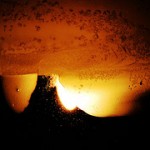Without Judas, the Crucifixion may not have taken place.
In the absence of Ma Kali, with her teeth dripping of blood, Lord Siva would have no consort to usher in a time of death and rebirth manifested through the fiery dance he performs when angry.
Upon raising the knife above his head, Abraham, out of obedience to Jehovah, moved to kill his son, Isaac, as sacrifice Abraham. In so doing Abraham opened the opportunity for God to show mercy by then ordering him to stop.
The antagonisms of our life provoke us to create.Had Noah not built the arc, despite accusations that he was insane, no one would have survived the flood.
Each time we write, we encounter a problem.
The blank page holds the possibilities of both birth and death. We come to life when writing, only to die once more upon finishing.
On receiving the words of Allah, now listed in the Qur’an, all the while thinking himself crazy and having lost his mind, the Prophet Muhammad opened himself to accepting the basis for what now supports the month of fasting and prayer, and also spiritual transformation, Ramadan, at the end of which occurs the Eid of celebration.
These stories address the greatest of problems, and the passion the flows from the human desire to surmount, move through, and transcend them.
The ultimate crisis arises from that long trek through the borderland regions where though upon a plateau, we encounter obstacles, the doubt that Thomas experienced when seeing Christ then risen from His greatest battle, that of death, underneath which always sits fear.
Fear constitutes the greatest antagonist as symbolized by Judas, the flood, the blood dripping from Kali’s fangs, the fire underneath Siva’s feet that catalyze him to dance and during which he, the godhead, presents those who study his movements connect with the Imago Dei that resides in each human individual.
Every opportunity to write presents the possibility for failure when we stop along the away, and never return–abandon our project. Or that we will find success by continuing forward.
An author as writer continually seeks to learn and improve her or his artistry and craft at composing stories. The writer as author perseveres like Mary Magdalene who visits the tomb of Christ three days after his death.
The writer finishes and revises the stories she or he sets out to write.
The best at our craft embody the qualities and strengths of both writer and author.
This is the greatest battle facing artists of the word.
What How do you feel when facing the blank page?
What stimulates you to write, the fill an empty page?
What keeps you writing?
What stops you?

